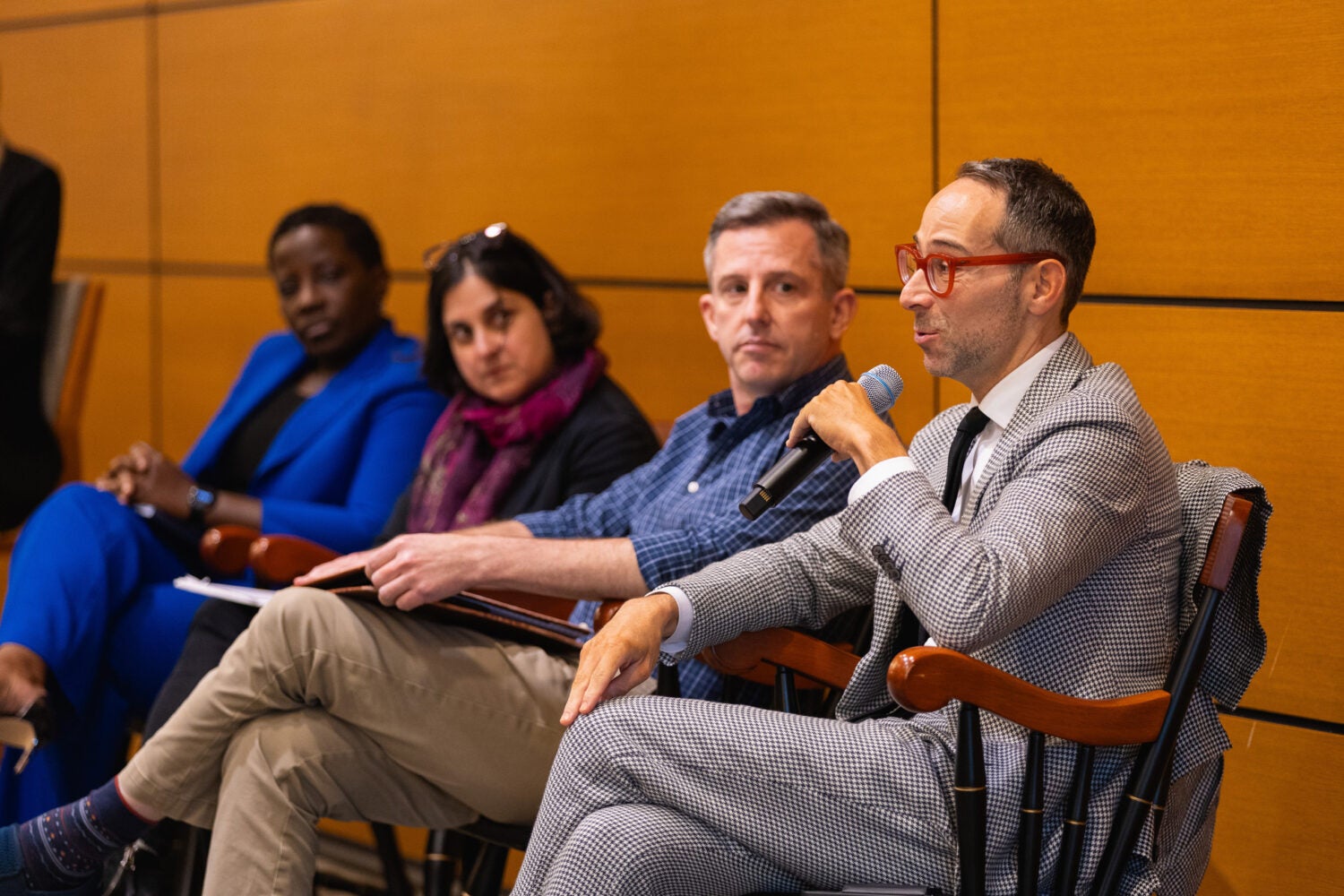“You are not alone.” “Work smarter, not harder.” “Don’t try to fit into molds that other people have created.” “Give yourself grace.”
Those were some of the many words of encouragement and advice for reducing stress shared by four members of the Harvard Law faculty at a lunchtime event on Sept. 23. Over the course of an hour, Clinical Professors Sabrineh Ardalan ’02, Michael Gregory ’04, and Dehlia Umunna, and Glenn Cohen ’03, the James A. Attwood and Leslie Williams Professor of Law, shared their experiences with mental health struggles and strategies for strengthening well-being.
The annual event, sponsored by the Dean of Students Office and Harvard Law School’s Student Well-Being Working Group, was part of an ongoing community effort to destigmatize mental health issues and offer support strategies.
Kicking off the discussion, student moderators, Gabrielle Lewis ’26 and Sophia Galitsky ’26, who both serve on the working group, asked panelists to reflect on their time in law school and share something they know now about mental health that they would share with their younger self.
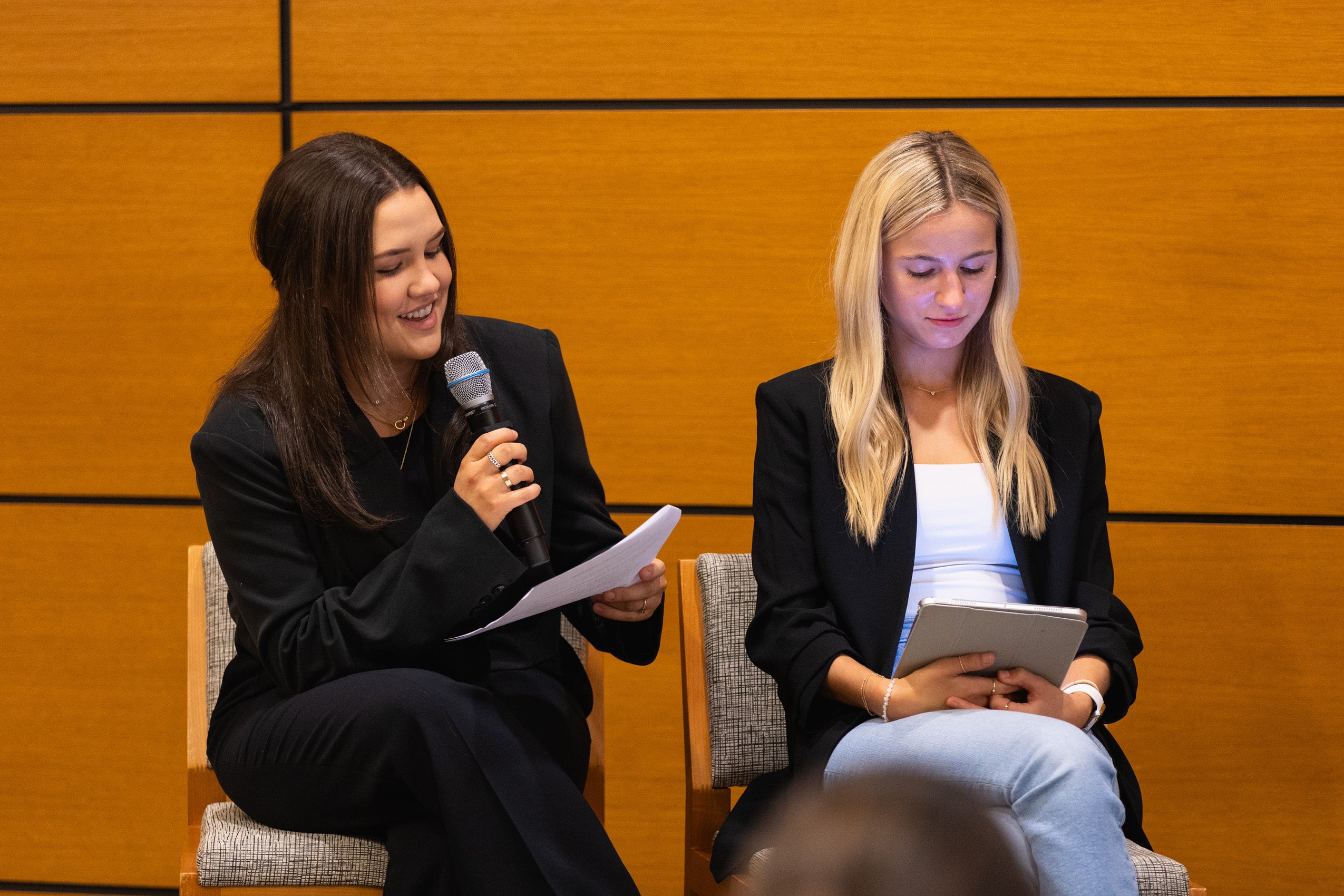
Umunna, faculty director of Harvard Law School’s Criminal Justice Institute, said she would tell her younger self that it’s okay to be all of who you are and not be apologetic about it.
“I’m Black, as you can see. I’m a woman, an immigrant, and a Christian. Those are the identities that I hold very dear and near to my heart,” she said. “And I think in law school, I didn’t really fully appreciate all of those identities and how they intersected, and how they informed who I was.”
She also would tell her younger self that it’s okay to cry. Growing up as a Black woman, she said, she was taught to “keep it moving” and not take time to process trauma. But she now knows how important it is to be present in the moment and process pain.
“I am learning to pause, process the trauma, process the pain, process the hurt,” she said. “Because I realize that if I don’t, unresolved trauma and pain and hurt has a way of manifesting itself in ways that are unhealthy and at inopportune times.”
Ardalan, director of the Harvard Immigration and Refugee Clinical Program, said she had a hard time during her first year of law school adjusting to how law is taught — “I didn’t know about cold calling. How I missed that is unclear to me.” But, she said, she has since learned to be okay with not knowing.
“As a lawyer, you can’t know everything. … it’s impossible. You’re always going to have to figure it out and learn it,” she said. “Being able to sit a little more comfortably with that discomfort and just recognizing that no one knows everything, that it is not the name of the game.”
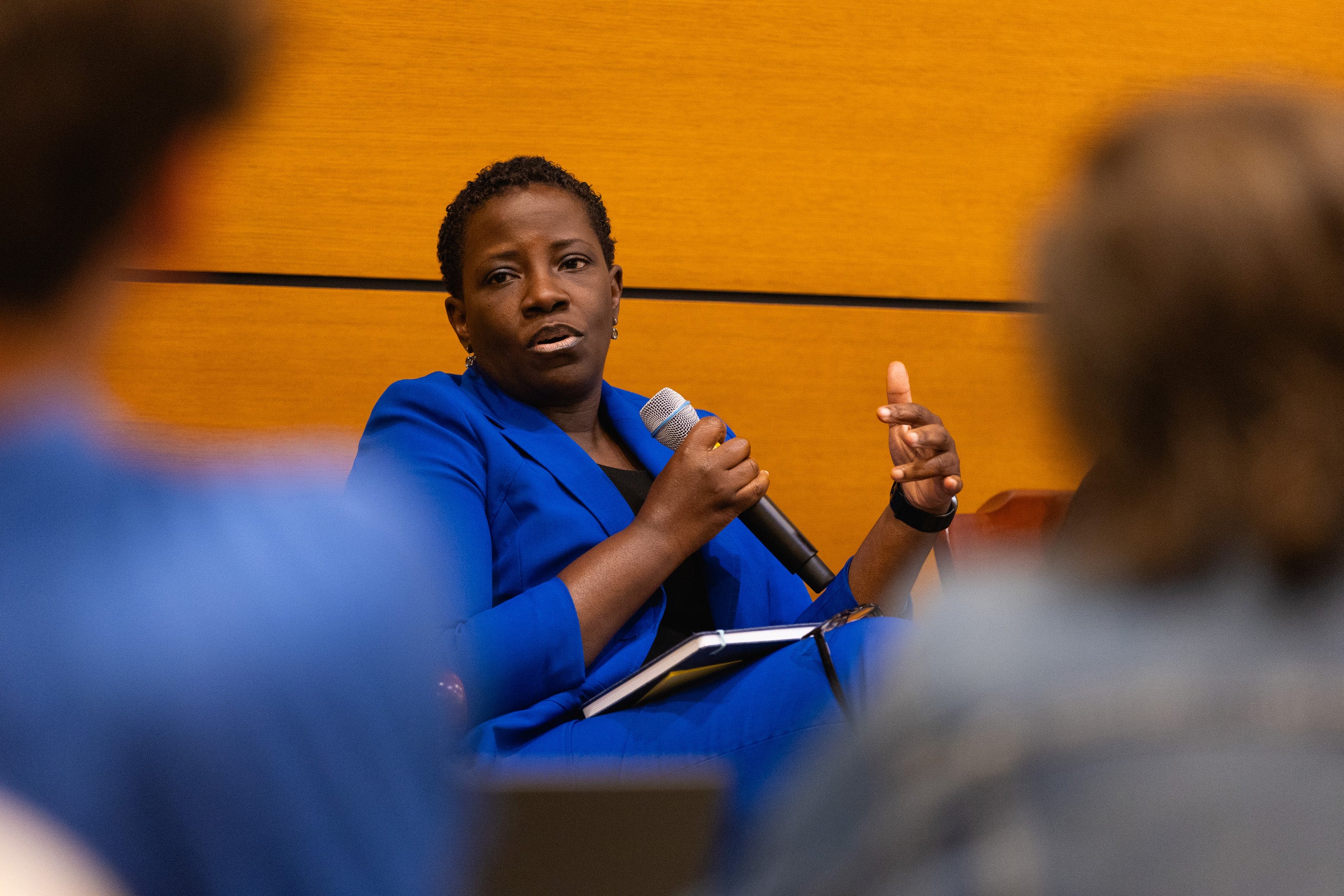
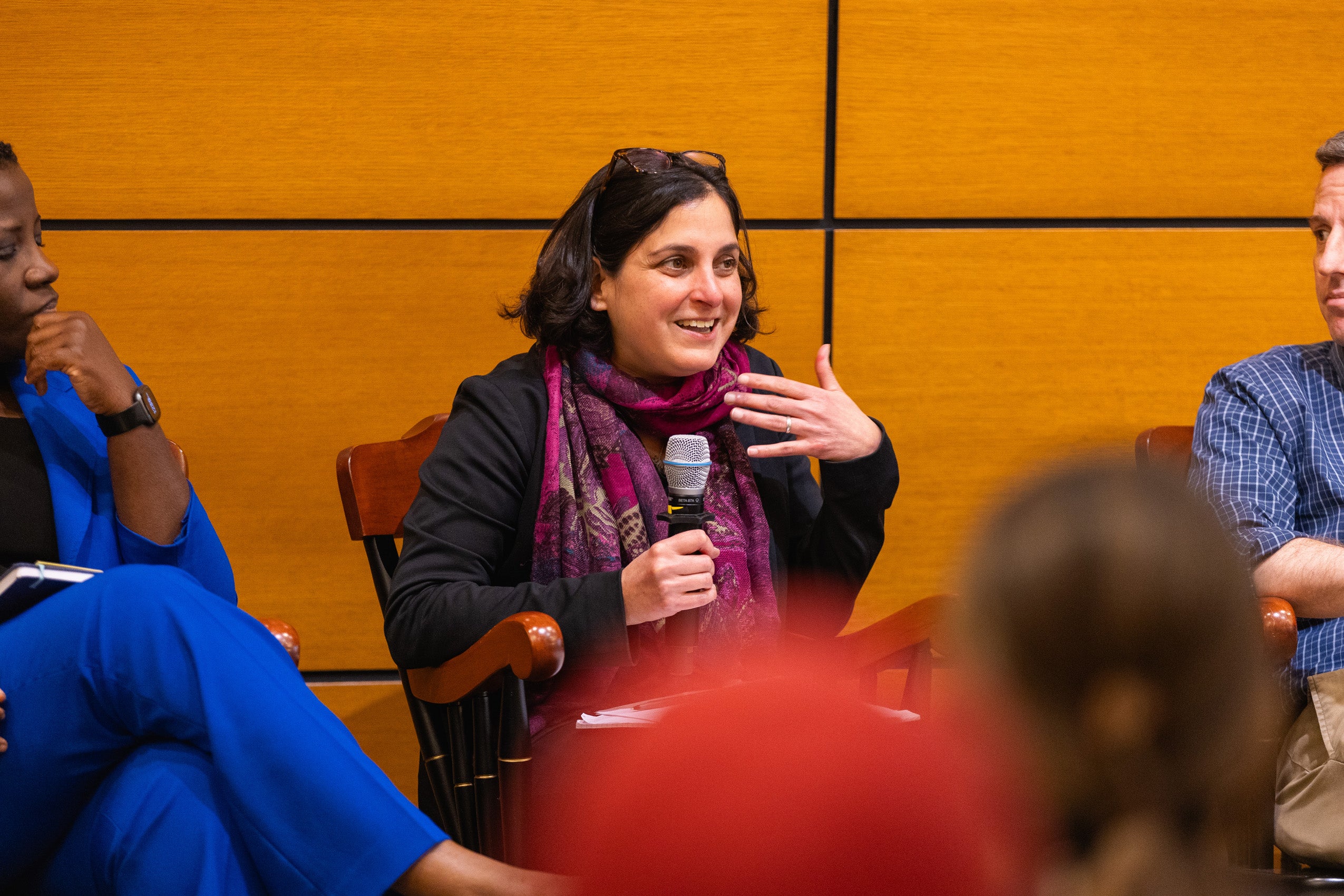
She also found that it was not the grades that she earned, but the friends that she made in law school that have had a lasting impact.
Gregory, faculty director of the Youth Advocacy & Policy Lab, agreed. He said pursuing a law degree can sometimes feel like a solitary endeavor, but being part of a community that will sustain you in stressful moments is among the most important thing you can do for your mental well-being.
Gregory, who is marking his 21st year working at Harvard Law, said he has had the “amazing fortune” to have a job where he loves to come to work every day.
“I didn’t self-consciously think about choosing a place to work where I would be surrounded by a team of loving, compassionate people, but I would tell [my younger self] that that should be a primary focus as you plan your futures.”
Cohen, the faculty director of the Petrie-Flom Center for Health Law Policy, Biotechnology & Bioethics and a deputy dean, said he would tell his younger self, “‘It’s good to party, but there’s such a thing as partying way too much.’” In retrospect, he said, he understands himself to suffer from anxiety and recognizes he was at the time self-medicating with alcohol. “That wasn’t great for my body, and it wasn’t great for me.”
Advice for well-being
When asked what strategies they employ to take care of their well-being and mental health, Cohen said he manages stress by establishing habits, which include exercising regularly, ending his day as routinely as possible, and ensuring that he gets enough sleep.
Cohen says he tells his students to keep a real sense of perspective. It’s okay to make mistakes in law school — to mess up on cold calls or in interactions — and learn, he said, when a client’s life or a huge deal is not on the line.
“We learn by failing,” he said. “If you know all the answers, it turns out this place is pretty useless for you.”
Ardalan said: “I go to therapy every week. That’s a habit when I became a lawyer and realized I had no place to process all the stress that was going on in my life. So, that’s been very helpful.”
She also credits her 5-year-old daughter with helping her stay focused on the present. She advised students to find like communities, reconnect with friends and family, and “cultivate moments of joy and laughter.”
Umunna said her work representing clients in criminal proceedings is incredibly stressful. “They’re just literally having the worst moment of their lives, and we absorb that, at least I do,” she said. “It takes you to a space where you have to be intentional about your well-being.”
She said she copes by blocking off an hour every morning for prayer: “My faith is central to who I am. It instructs me.”
When asked for the best piece of advice for happiness as a lawyer and a person, Ardalan said, “Figure out what resonates for you, and what is fulfilling.” Gregory agreed, advising students to make sure that they take on work that corresponds to what they’re passionate about. “Almost no matter what you do as a lawyer, you’re going to be working a lot of hours, so you better be putting those hours into something that really speaks to who you are in your soul.”
An audience member asked panelists about strategies for countering imposter syndrome and feelings of not belonging.
Gregory, who said he could speak directly to that from his experience as a first-generation college student, said he would urge anybody who feels like an imposter here to know that can be a source of empowerment.
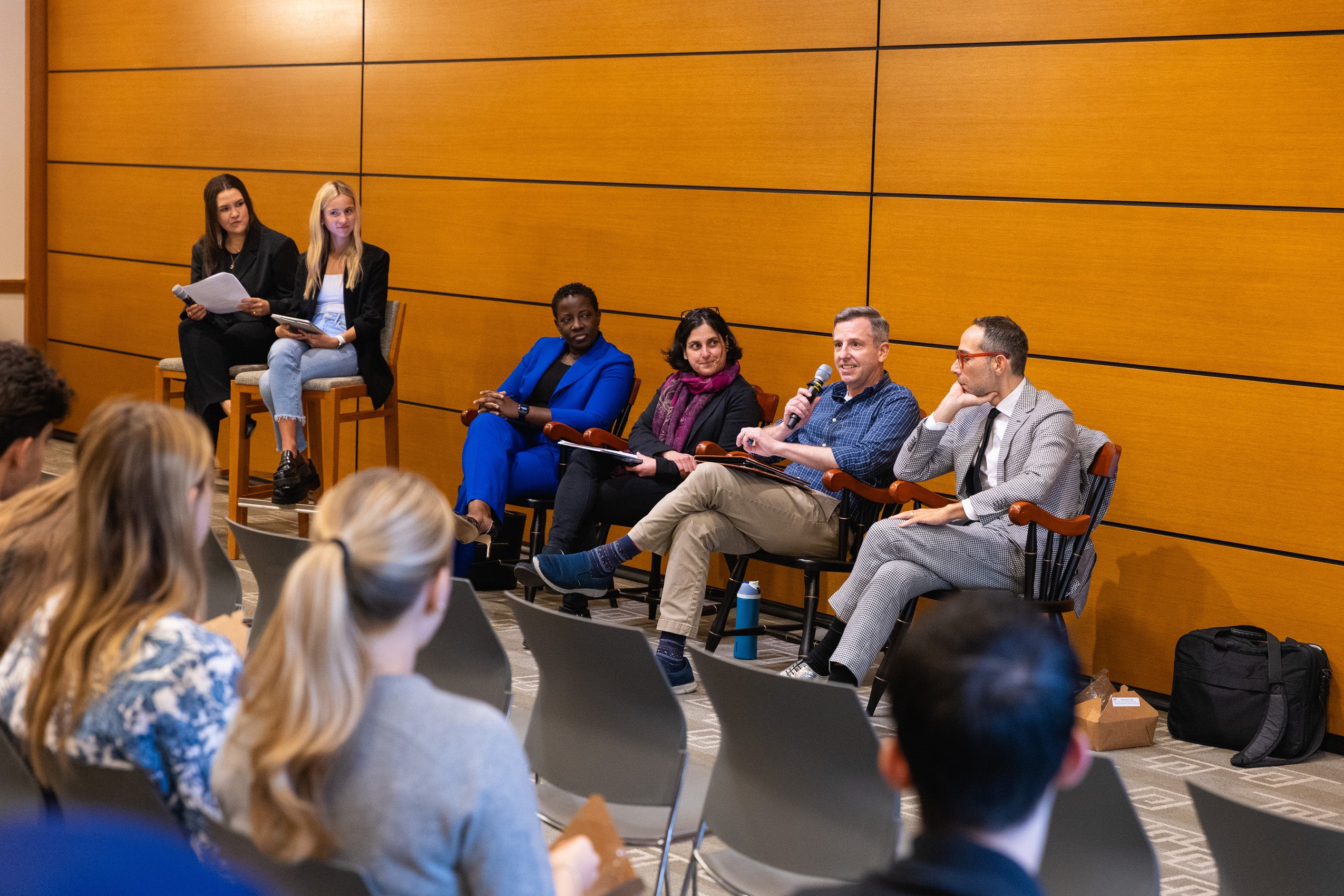
“I felt a lot of imposter syndrome when I came to law school here,” he said. “And I think the thing that I’ve learned over time is that if all of this is unfamiliar to you, that’s your source of power, because you have an opportunity to critique what’s going on here in a way that people for whom it’s second nature haven’t stopped to realize that this is only one way of thinking and being.”
“The first step to remember is that you’re not alone,” said Umunna. “I promise you, pretty much everyone goes through [imposter syndrome] in some form or shape, and you just need to be mindful, as my late dad would always say, ‘This too shall pass.’”
She also advised students to surround themselves with at least one or two people who know them well, who can hold them accountable, but who can also “speak life” to them and get them out of their head.
Another student in the audience expressed the despair she was feeling at the seemingly endless cycle of working to exhaustion and still feeling like she hasn’t done enough.
Umunna was quick to thank the student for sharing and reassured her she is not alone. “I’ve been a lawyer 26 years, and so I still go through that,” she said. “You have two choices. One, you can let that completely cloud what you plan on doing,” she said. “Or you can say, like I said to myself, ‘Dehlia, you’ve done enough for today, right? You literally have done enough for today.’”
Cohen reassured the student that the course load in terms of credits in the fall semester is greater than at any other time, “So, it’s going to get better,” he said.
While conceding it might seem like “bro” advice, Cohen made an analogy to weightlifting. To build strength, sometimes it’s important to take on more weight than you’ve been used to, which will be challenging and likely hurt the next day, he said. But, he cautioned, there is such a thing as overtraining, where you’re not getting the gains you want, and you might hurt yourself.
“The real question for yourself is to understand which of the two am I doing?” said Cohen. “Am I doing the thing that’s actually helping me grow and helping me improve a little bit more every day, or is it too much?”
He advised students to take a hard look at their daily planner, and figure out how they’re spending their time, asking themselves if they’re working hard or working smart. In concrete terms, he said, that could mean if a student is facing more than 40 pages of Civ Pro reading, for example, they could set a timer and train themselves to progressively read more in an allotted time.
Wrapping up the session, Ardalan told students that the panelists’ “doors are always open” for support and advice. Umunna encouraged students to “take stock daily” and establish a supportive community.
“I want to make a push for you not to struggle alone. If at any point you find that you’re overwhelmed, you’re getting anxious, even when things are going well, have a community that you’re checking in with. Have somebody who’s checking in on you,” said Umunna. “Don’t wait until you’re drowning before you seek out the help.”
Want to stay up to date with Harvard Law Today? Sign up for our weekly newsletter.
